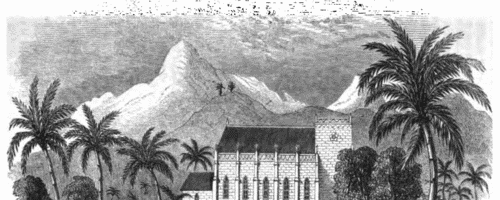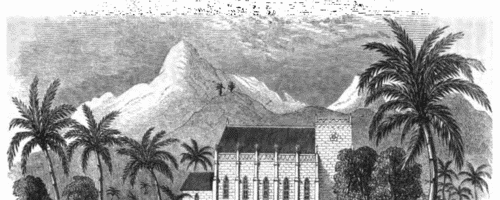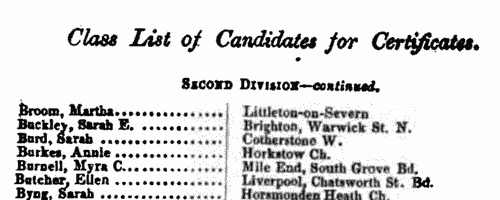Frostick Surname Ancestry ResultsOur indexes 1000-1999 include entries for the spelling 'frostick'. In the period you have requested, we have the following 43 records (displaying 21 to 30): Single Surname Subscription | | | Buying all 43 results of this search individually would cost £262.00. But you can have free access to all 43 records for a year, to view, to save and print, for £100. Save £162.00. More... |
These sample scans are from the original record. You will get scans of the full pages or articles where the surname you searched for has been found. Your web browser may prevent the sample windows from opening; in this case please change your browser settings to allow pop-up windows from this site. Electors of Wood Dalling
(1840)
The register of electors entitled to vote in any parliamentary election for East Norfolk between 1 November 1840 and 1 November 1841 lists 8,556 freeholders arranged by hundred and within hundred by parish or township &c. In the first column, after number within the register, the elector's name is given (surname first); the second column gives place of abode; the third column the nature of qualification (such as 'owner and occupier'); and the fourth column the address of the qualifying property, in some cases with the name of the tenant or occupier.FROSTICK. Cost: £4.00.  | Sample scan, click to enlarge

|  Persons of standing recommending London police recruits
(1830-1842) Persons of standing recommending London police recruits
(1830-1842)
The Metropolitan Police Register of Joiners (MEPO 333/4) lists policemen joining the force through to 31 December 1842 (to warrant number 19892). The register is alphabetical, in so far as the recruits are listed chronologically grouped under first letter of surname. It is evidently a continuation of a similar earlier register, not closed until its alphabetical sections were filled: consequently, there are no entries in this register for the initial letters N, O, Q, U, V, X, Y or Z; and the sections of this register start at different dates - A 18 April 1840 (warrant number 16894); B 11 December 1830 (5570); C 7 September 1830 (4988); D 27 May 1833 (8445); E 15 December 1838 (14476); F 30 March 1832 (7372); G 1 December 1835 (11,184); H 25 April 1832 (7457); I and J 13 February 1837 (12449); K 2 January 1838 (13457); L 3 October 1834 (9905); M 15 November 1832 (7999); P 4 October 1831 (6869); R 4 September 1837 (13021); S 30 March 1835 (10366); T 6 April 1840 (16829); W 30 December 1833 (9096). The register gives Date of Appointment, Name, Number of Warrant, Cause of Removal from Force (resigned, dismissed, promoted or died), and Date of Removal. Those recruits not formerly in the police, the army, or some government department, were required to provide (normally) at least two letters of recommendation from persons of standing, and details of these are entered on the facing pages: the names in these are indexed here (the police recruits are indexed separately and not included here). Recruits transferred from other forces or rejoining the force did not normally need recommendations - in the latter case, former warrant numbers are given - but some recommendations are from police inspectors, even other constables. Recruits coming from the army sometimes have general military certificates of good conduct, but most often have a letter from their former commanding officer; recruits recommended by government departments (most often the Home Office) similarly have letters from the head of department. But the great majority of the names and addresses in these pages are of respectable citizens having some sort of personal acquaintance with the recruit. Where more than two recommendations were provided, the clerk would only record one or two, with the words 'and others'. Tradesmen are sometimes identified as such by their occupations; there are some gentry. Although the great bulk of these names are from London and the home counties, a scattering are from further afield throughout Britain and Ireland. FROSTICK. Cost: £8.00.  | Sample scan, click to enlarge

| Missionary donations from Norfolk
(1855)
The Congregational and a number of other independent churches together formed the Evangelical Alliance, committed to promoting and supporting missions to the heathen. The areas chosen for their projects were Guiana, South Africa, India, the South Seas and China. The work of the missionaries was not only in preaching the Gospel, but also in translating the Bible into local languages, and establishing churches, schools and orphanages. Orphans and native teachers were often given the names of principal contributors or congregations back in Britain. In Britain the large amounts of money needed for this work were raised among the Congregational and independent congregations, arranged by auxiliaries for each county (although some contributions for each county might in fact come in from congregations and individuals in neighbouring areas); money was gathered by ministers, at special services, by supporters, and in missionary boxes. The accounts of all these contributions were published as part of a monthly magazine called the Evangelical Magazine. Each issue of the magazine carried obituaries of prominent members of the congregations; general articles on religion; reviews of newly-published religious books; home news, mainly about meetings of importance or interest by the alliance or in individual churches; and then a separate section called the Missionary Chronicle. The Missionary Chronicle was devoted to letters and reports from the missionaries; and concludes with a set of accounts of donations towards the missionary work. This is the index to the donations reported in the magazine, January to December 1855, from Norfolk.FROSTICK. Cost: £6.00.  | Sample scan, click to enlarge

| News from Congregational and Independent churches
(1855)
The Congregational and a number of other independent churches together formed the Evangelical Alliance, committed to promoting and supporting missions to the heathen. The areas chosen for their projects were Guiana, South Africa, India, the South Seas and China. The work of the missionaries was not only in preaching the Gospel, but also in translating the Bible into local languages, and establishing churches, schools and orphanages. Orphans and native teachers were often given the names of principal contributors or congregations back in Britain. In Britain the large amounts of money needed for this work were raised among the Congregational and independent congregations, arranged by auxiliaries for each county (although some contributions for each county might in fact come in from congregations and individuals in neighbouring areas); money was gathered by ministers, at special services, by supporters, and in missionary boxes. The accounts of all these contributions were published as part of a monthly magazine called the Evangelical Magazine. Each issue of the magazine carried obituaries of prominent members of the congregations; general articles on religion; reviews of newly-published religious books; home news, mainly about meetings of importance or interest by the alliance or in individual churches; and then a separate section called the Missionary Chronicle. The Missionary Chronicle was devoted to letters and reports from the missionaries; and concludes with a set of accounts of donations towards the missionary work. This is the index to the home news reported in the magazine, January to December 1855.FROSTICK. Cost: £6.00.  | Sample scan, click to enlarge

| Traders and professionals in London
(1856)
The Post Office London Directory for 1856 includes this 'Commercial and Professional Directory', recording over 100,000 individuals. FROSTICK. Cost: £4.00.  | Sample scan, click to enlarge

| Insolvents
(1857)
Insolvency notices for England and Wales: insolvency often caused people to restart their lives elsewhere, so these are an important source for lost linksFROSTICK. Cost: £6.00.  | Sample scan, click to enlarge

|  Sailors and marines on board Her Majesty's ship Scout
(1860) Sailors and marines on board Her Majesty's ship Scout
(1860)
The China Medal was awarded to soldiers and sailors involved in the various actions of the war against China, in which this ship was engaged in 1860. The medals were either delivered on board or sent on in 1862: except that many of the men were no longer immediately traceable, and the remarks on the roll show that some medals were not sent on for several years, and some were never sent. After the main roll there is a section showing which of the men also qualified for clasps. Separate clasps were awarded for men who had been in receipt of the China Medal of 1842; for the taking of Fatshan in 1857, Canton in 1857, Taku Forts in 1858, Taku Forts in 1860, and Pekin in 1860. Most of the men on this ship are shown as having been given the Taku Forts 1860 clasp, for being actually present at the capture of the Taku Forts 21 August 1860; and the Pekin clasp, for being actually present before Pekin the day the gate of that city was given up to the allied (British and French) army, viz. on 13 October 1860.FROSTICK. Cost: £8.00.  | Sample scan, click to enlarge

| Civil Service Appointments
(1862)
The Civil Service Commission published an annual list of all persons who had obtained certificates of qualification for appointment in the various public departments. The list gives full name (surname first); department (such as Post Office, or Inland Revenue); situation (such as Letter-carrier, or Clerk); and date of certificate. Candidates whose names are preceded by a dagger obtained appointments as the result of competition; a double dagger indicates open competition. Those whose names are preceded by an asterisk obtained honorary additions to their certificates either for proficiency in extra subjects chosen by themselves, or for marked proficiency in the prescribed subjects. Then follows a further list of these candidates who had obtained Honorary Additions to their Certificates in this way: giving name (surname and initials); position in the service (department and situation); subjects for which honorary additions were made; and 'extent of knowledge displayed' (such as Creditable, Fair, or Very Creditable). 1 January to 31 December 1862.FROSTICK. Cost: £4.00.  | Sample scan, click to enlarge

| Pupil Teachers training to become masters in Elementary Schools
(1875)
The Education Department set examinations for candidates for admission into training colleges, and to become teachers. This is the class list (in order of merit) of the men who took the examination to become masters in elementary schools at Christmas 1875. The candidates' names are listed alphabetically by surname within each division, with school in which engaged (N. for National School, Ch. Church of England, B. British School, W. Wesleyan, R. Roman Catholic, P. Parochial, Bd. Board School, Indl. Industrial School). (The sample scan is from a general class list for schoolmistresses)FROSTICK. Cost: £6.00.  | Sample scan, click to enlarge

| Missing Next-of-Kin and Heirs-at-Law
(1880)
The Unclaimed Money Registry and Next-of-Kin Advertisement Office of F. H. Dougal & Co., on the Strand in London, published a comprehensive 'Index to Advertisements for Next of Kin, Heirs at Law, Legatees, &c., &c., who have been Advertised for to Claim Money and Property in Great Britain and all Parts of the World; also Annuitants, Shareholders, Intestates, Testators, Missing Friends, Creditors or their Representatives, Claimants, Unclaimed and Reclaimed Dividends and Stock, Citations, Administrations, Rewards for Certificates, Wills, Advertisements, &c., Claims, Unclaimed Balances, Packages, Addresses, Parish Clerks' Notices, Foreign Intestates, &c., &c.' The original list was compiled about 1860, but from materials dating back even into the 18th century: most of the references belong to 1850 to 1880. For each entry only a name is given, sometimes with a placename added in brackets: there may be a reference number, but there is no key by which the original advertisement may be traced. The enquirer of the time had to remit £1 for a 'Full and Authentic Copy of the Original Advertisement, together with name and date of newspaper in which the same appeared'. FROSTICK. Cost: £4.00.  | Sample scan, click to enlarge

|
Research your ancestry, family history, genealogy and one-name study by direct access to original records and archives indexed by surname.
|













